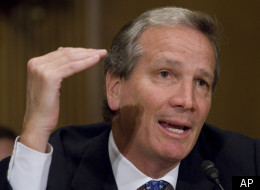The former CEO of one of the Wall Street firms most synonymous with financial collapse says in retrospect that there's "not much" he would've done differently before his firm imploded in 2008.
"You can go back and say, should we have done some things differently leading up to the environment we got in?" Alan Schwartz, the CEO of Bear Stearns during the firm's meltdown in 2008, said in an interview with CNBC. "You know, you can always say that. Hindsight is 20/20."
The first of the large Wall Street firms to go under during the financial crisis, Bear Stearns ran out of cash in mid-March 2008 and was rescued from bankruptcy through a deal involving JPMorgan Chase and the Federal Reserve Board days later. The collapse of the company, one of the biggest underwriters of risky mortgage-backed securities, portended the major Wall Street meltdown that was to come a few short months later.
During the real estate boom, banks started giving out loans to borrowers who normally don’t qualify for them, and sold them to Wall Street firms. The firms in turn created complex securities from these mortgage loans, and sold them to investors.
When the housing market began to crumble and borrowers started defaulting on their loans, investors lost confidence in Bears' ability to uphold the copious agreements it had with other financial institutions, leading to a slew of withdrawals and executives' realization that they didn't have enough cash to continue operating. Stock portfolios also suffered a huge blow after the firm agreed to be bought for 93 percent less than the closing price on the Friday before the sale.
The fallout from the firm's meltdown not only shook Wall Street investors -- it also hit Bears' employees hard. Of the company's 14,000 employees, only 5,000 lasted through to the sale to JPMorgan, according to the Wall Street Journal.
Schwartz was at least somewhat apologetic for executives' actions during the collapse.
“Those of us who were responsible for the firm were supposed to keep it out of trouble, and we didn’t,” Schwartz said in the CNBC interview.
Original Article
Source: Huff
Author: Khadeeja Safdar
"You can go back and say, should we have done some things differently leading up to the environment we got in?" Alan Schwartz, the CEO of Bear Stearns during the firm's meltdown in 2008, said in an interview with CNBC. "You know, you can always say that. Hindsight is 20/20."
The first of the large Wall Street firms to go under during the financial crisis, Bear Stearns ran out of cash in mid-March 2008 and was rescued from bankruptcy through a deal involving JPMorgan Chase and the Federal Reserve Board days later. The collapse of the company, one of the biggest underwriters of risky mortgage-backed securities, portended the major Wall Street meltdown that was to come a few short months later.
During the real estate boom, banks started giving out loans to borrowers who normally don’t qualify for them, and sold them to Wall Street firms. The firms in turn created complex securities from these mortgage loans, and sold them to investors.
When the housing market began to crumble and borrowers started defaulting on their loans, investors lost confidence in Bears' ability to uphold the copious agreements it had with other financial institutions, leading to a slew of withdrawals and executives' realization that they didn't have enough cash to continue operating. Stock portfolios also suffered a huge blow after the firm agreed to be bought for 93 percent less than the closing price on the Friday before the sale.
The fallout from the firm's meltdown not only shook Wall Street investors -- it also hit Bears' employees hard. Of the company's 14,000 employees, only 5,000 lasted through to the sale to JPMorgan, according to the Wall Street Journal.
Schwartz was at least somewhat apologetic for executives' actions during the collapse.
“Those of us who were responsible for the firm were supposed to keep it out of trouble, and we didn’t,” Schwartz said in the CNBC interview.
Original Article
Source: Huff
Author: Khadeeja Safdar

No comments:
Post a Comment